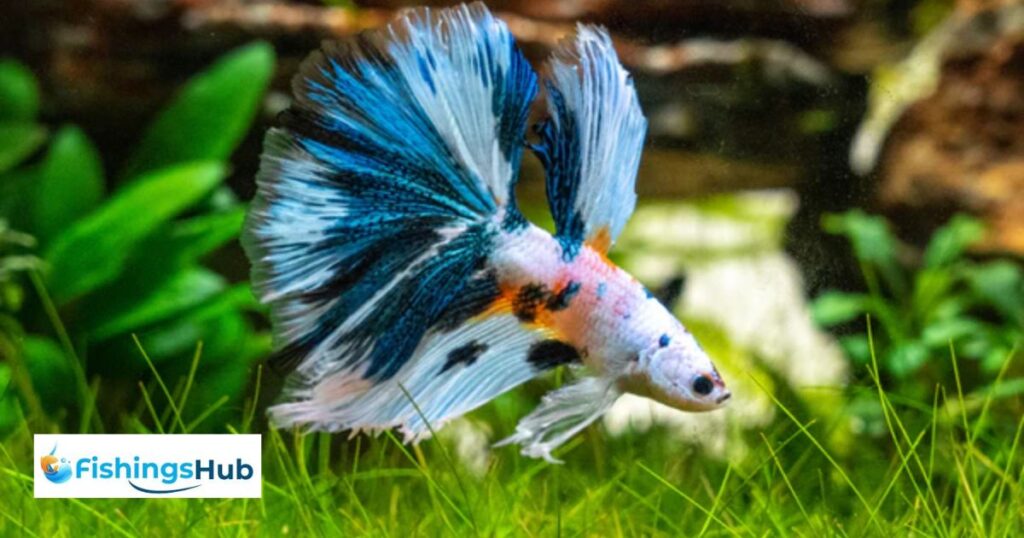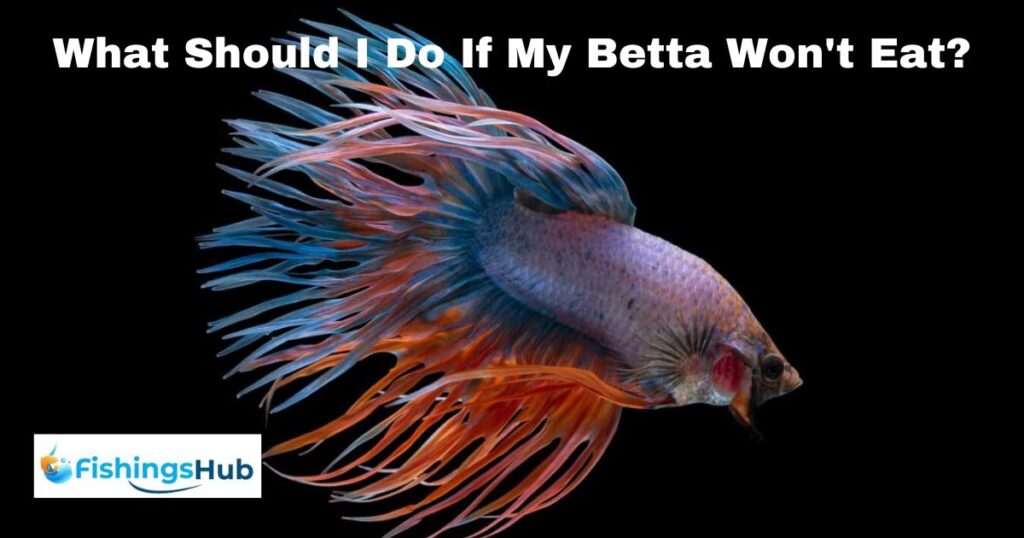Betta fish, loved for their vibrant hues and captivating behaviors, stand out as cherished companions in the world of pet enthusiasts. These beautiful creatures can adapt and flourish in diverse environments, making them a favorite among hobbyists. Just like any living being, Betta fish rely on sustenance for their well-being.
For Betta keepers, ensuring a nourishing diet is a paramount duty. Taking care of these fish involves providing them with the essential nutrients to keep them happy and healthy. However, situations may arise where feeding becomes a challenge, such as when the keeper embarks on a trip or vacation. This leads to a crucial question: how long can Betta fish go without food? This aspect is pivotal for the responsible care of these beloved aquatic companions.
The Natural Feeding Method For Bettas

When taking care of your betta fish, it’s important to understand their eating habits. In the wild, bettas eat insects, small creatures, and sometimes go without food for days. Even your pet betta has some of these natural behaviors. So, if you need to leave home for a short time, don’t worry too much about feeding.
Some betta owners even skip feeding their fish one or two days a week to keep them healthy. Just remember to give them good, fresh food and occasionally treat them with live or frozen snacks.
How Long Can a Betta Fish Go Without Food?
In their natural environment, Bettas can go without food for a few weeks because food is often hard to find. They are built to handle periods without eating. However, Bettas kept in aquariums are different. They aren’t used to going hungry and can get very stressed if they don’t eat for too long.
Even though Bettas are tough, they can only last up to two weeks without food. But, during this time, they become weak and can easily get sick. So, it’s important to feed your pet Betta regularly and not let it go too long without food.
What Happens When Betta Fish Go Without Food?
Betta fish can actually enjoy short periods without food. If they don’t eat for a day or two, it helps them clear out waste from their bodies. This break from eating, known as fasting, is especially good if a Betta is feeling sick or bloated.
But be careful! If you don’t feed them for too long, like more than two weeks, they can get very weak and might even die. Plus, not eating can make them stressed and more likely to get sick. So, while a short fast can be okay, it’s important to make sure your Betta gets the food and nutrients it needs regularly.
Caring For Your Betta While On Vacation

Taking care of your betta while on vacation involves two key considerations: feeding and maintaining your aquarium water. Here are some simple tips to ensure your betta stays happy and healthy:
- Feeding Your Betta:
- For 2-3 days, fasting your betta is okay, but avoid making it a regular habit.
- If you’ll be away for a week, consider getting a pet sitter who can feed your betta every other day.
- Alternatively, think about using an automatic feeder attached to your tank for precise pellet portions.
- More than 1 Week:
- For longer vacations, having a reliable sitter is crucial. They should not only feed your betta but also perform a partial water change to maintain the aquarium’s water quality.
By considering these options based on your trip length, you can make sure your betta receives the care it needs while you enjoy your vacation.
Tips For Keeping Your Betta Healthy While You Are Away:
- Automatic Feeder: Invest in an automatic fish feeder like Petbank or FISHNOSH. This ensures your Betta gets fed even if you’re not around. Remember to calibrate it right to avoid overfeeding.
- High-Quality Diet: Offer a mix of quality dry and wet foods to your Betta. If possible, include treats like brine shrimp or bloodworms. A varied diet is key!
- Water Quality: Before leaving, change at least half of the tank water and use a water conditioner. Clean water is essential for Betta’s well-being.
- Tank Environment: Ensure the tank is in a cool place away from direct sunlight or heaters. Temperature stability is crucial.
- Tank Mate Option: Think about adding a compatible tank mate for longer trips. It can stimulate your Betta and keep it active.
- Check-ups: If away for a month or more, have someone check on your Betta weekly. They can ensure everything’s okay and adjust the feeder if needed.
- Day/Night Cycle: Use automatic timers to maintain a consistent light cycle. It’s vital for both the Betta and any tank plants.
- Health Check: Monitor your Betta’s health a few days before leaving. Address any issues beforehand for peace of mind during your absence.
What Should I Do If My Betta Won’t Eat?

If your betta fish isn’t eating, don’t panic. Here’s what you can do:
- Check the water quality in the tank.
- Make sure you’re using the right kind of fish food.
- Look out for any signs of illness in your betta.
- Consider any environmental factors like strong currents or disturbances.
If everything seems fine but your betta still won’t eat, it might be picky. Try offering live foods like daphnia or bloodworms. If it eats these, you can later switch to pellets or flakes. Always give new foods a chance, but never introduce something new if you’re leaving for a long time. Your betta shouldn’t go hungry.
FAQ’s
Is it OK to not feed my betta for a week?
The maximum time you can be away without feeding is 4-7 days. Fasting shouldn’t be a regular habit. If possible, ask a friend or relative to care for your betta, providing clear feeding instructions for peace of mind.
What does an overfed betta look like?
If your betta shows signs of stress like tilting over or having a bloated belly, it might be overfed. Betta stomachs are near the gills, and they might even regurgitate their food.
Why is my betta fish not moving?
As tropical fish, betta fish prefer warm water to survive. Too much cold can make them lethargic and uninterested. In a similar vein, low-quality water that is, high ammonia levels can also affect their activity.
Why is my betta fish laying sideways at the top of the tank?
Healthy fish often lay on their sides due to limited space, common in small pet store cups. Upgrading to a gallon of water per inch of fish can stop this behavior.
What does stress look like in fish?
Make frequent observations of your fish to look for any indications of stress. Gasping at the Surface: Stress caused by unfavorable water conditions, typically a shortage of oxygen, is indicated if a fish is gasping his mouth at the surface. Appetite: A stressed-out fish frequently refuses to eat.
Final Thoughts
Caring for betta fish involves understanding their natural feeding habits and providing a balanced diet. While they can endure short periods without food, it’s crucial to maintain regular feeding to prevent stress and illness. Bettas can go without food for up to two weeks, but it’s not ideal, and they may become weak. When going on vacation, plan for proper feeding, water maintenance, and consider options like automatic feeders or pet sitters.
Monitoring your betta’s health and addressing any issues beforehand ensures a happy and healthy aquatic companion. If your betta won’t eat, check water quality, use the right food, and consider environmental factors, but avoid introducing new foods before a long absence. Keeping your betta well-fed and content contributes to their overall well-being.

